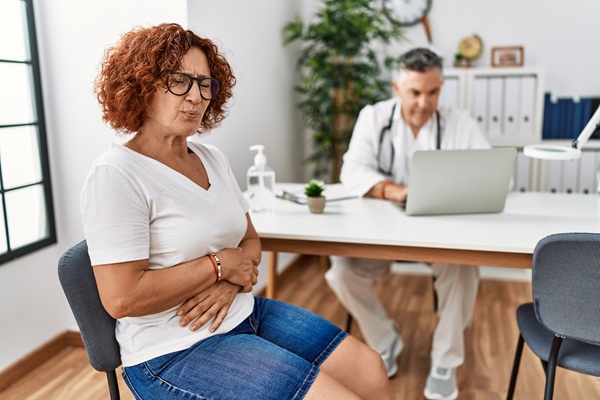Abdominal Pain After Eating: What Could Be the Cause?

Abdominal pain after meals can signal simple irritation or a condition that needs timely evaluation. Food pushes the digestive system to work, so symptoms often reveal useful clues: patterns, triggers, and timing guide diagnosis. Gastroenterologists look for red flags while helping patients find relief.
Common causes of abdominal pain after meals
Abdominal pain after meals often follows recognizable patterns that point to specific diagnoses. Timing, location, and food triggers reveal whether the source involves bile flow, stomach lining, pancreatic enzymes, or intestinal sensitivity—clear descriptions of symptoms and their context guide efficient testing and faster relief.
- Gallstones block bile flow and trigger pain in the right upper abdomen, often after fatty foods
- Gastritis or ulcers inflame the stomach lining and cause burning discomfort or nausea
- Pancreatitis flares when the pancreas struggles with fat-heavy meals and alcohol
- Food intolerances, including lactose or fructose malabsorption, lead to bloating, gas, and cramping
- Celiac disease reacts to gluten and damages the small intestine, causing diarrhea, weight loss, and fatigue
- Irritable bowel syndrome heightens sensitivity and causes cramping that improves after a bowel movement
- Acid reflux sends stomach contents upward and causes burning chest or upper abdominal pain
These causes vary in urgency, but each follows a logic that careful history and targeted exams can confirm. Tracking patterns and avoiding known irritants reduce flares while a formal evaluation rules out serious disease. With a defined diagnosis, a gastroenterologist aligns treatment to the cause and restores comfortable, confident eating.
When to seek care
Go beyond home remedies when abdominal pain keeps returning, wakes you from sleep, or follows even simple meals. Seek urgent care for fever, vomiting, black or bloody stools, chest pain, or persistent right-lower-quadrant pain. Unintentional weight loss, progressive vomiting, or pain after new medications also deserve prompt evaluation.
How a gastroenterologist evaluates
Clinicians begin with a focused history, including timing, location, relation to specific foods, and bowel habits. A physical exam looks for tenderness and organ enlargement. Blood tests, stool studies, and ultrasound or CT imaging define inflammation, gallstones, or obstruction. Endoscopy reveals ulcers, celiac injury, or reflux changes and allows biopsies. Gastroenterologists translate these findings into a clear plan and timeline.
Relief and prevention
Match treatment to the cause. Gallstones may need surgery. Ulcers heal with acid suppression and H. pylori therapy. Pancreatitis needs alcohol avoidance and fat restriction. Intolerances improve with elimination trials and enzyme support. Celiac disease requires strict gluten avoidance. IBS benefits from fiber balance, stress management, and neuromodulators. Reflux often improves with weight loss, earlier dinners, and acid-reducing medication. These steps lower the risk of recurring abdominal pain.
The bottom line
Abdominal pain after eating deserves attention, not worry. Track triggers, avoid irritants, and seek evaluation when symptoms persist or escalate. With clear diagnosis and targeted treatment, most people regain comfortable and confident eating habits. For more information or to schedule an appointment, call our office at (718) 747-9630.
To schedule a consultation, please request an appointment on our website at https://pinnaclegi.com or call Pinnacle Gastroenterology at (718) 747-9630 to arrange an appointment at our Forest Hills office.
Check out what others are saying about our services on Yelp: Abdominal Pain in Forest Hills, NY.
Related Posts
Hemorrhoid treatment and prevention address swollen veins in the lower rectum or anus that cause pain, itching, and bleeding. Internal hemorrhoids form inside the rectum, while external hemorrhoids form under the skin near the anus. Pressure from prolonged sitting, hard stools, pregnancy, and heavy lifting contributes to symptoms. Genetics, low fiber intake, and inadequate hydration…
Endoscopy services provide an inside view of the digestive tract, offering detailed images that help detect conditions such as inflammation, ulcers, polyps, and other abnormalities. These procedures allow gastroenterologists to examine the esophagus, stomach, or colon without the need for major surgery. Understanding how to prepare and what the experience involves can ease anxiety and…
Celiac disease is a chronic autoimmune condition that impairs the small intestine's ability to absorb nutrients. It is triggered by gluten, a protein found in wheat, barley, and rye. When left unmanaged, this condition can cause digestive issues and even systemic complications. A gastroenterologist can diagnose celiac disease and help patients manage the condition to…
GI doctors, or gastrointestinal doctors, have expertise that covers digestive health from the esophagus to the colon, and timely care prevents small issues from becoming urgent problems. With advanced diagnostics and targeted therapies, these doctors evaluate symptoms, identify root causes, and build plans that restore comfort and long-term function. Below are some common conditions that…
